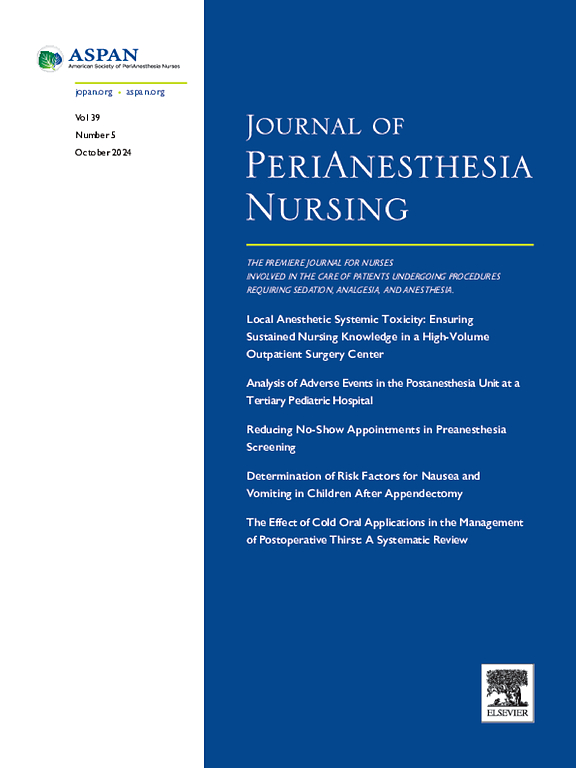Comparison of Postprocedure Cardiac Catheterization Recovery Instructions on Participant’s Perceived Comprehension and Satisfaction
IF 1.6
4区 医学
Q2 NURSING
引用次数: 0
Abstract
Purpose
The purpose of this study was to evaluate the effect of education timing on patient satisfaction and perceived knowledge comprehension of recovery instructions in cardiac catheterization patients.
Design
This prospective quasi-experimental single-blinded study was blinded to the participant.
Methods
This study was conducted between January and August 2022 in the cardiac catheterization laboratory of a New York metropolitan community hospital. Seventy-seven cardiac catheterization participants were randomized into two groups. The intervention group (n = 40) received instructions preprocedurally, while the control group (n = 37) received instructions per standard of care postprocedurally. The study team designed a nine-question satisfaction and perceived comprehension survey, which was used as the primary data collection tool. Data were collected through telephone interviews conducted 24 to 48 hours postprocedure. Chi-square (χ2) analysis was used to determine associations between the two groups.
Findings
Results revealed the participants in the intervention group (97.5%, n = 39) were more satisfied than those in the control group (83.8%, n = 31). Satisfaction with instructions about managing arterial bleeding was higher in the intervention group (100%, n = 40) than in the control group (83.8%, n = 31). There was a statistically significant difference in perceived comprehension of management of arterial bleeding (χ2 = 5.22, P < .05) and management difficulty urinating (χ2 = 5.69, P < .05), where the intervention group scored significantly higher than the control group. Major feedback from participants included recommendations to enhance written instructions for clarity.
Conclusions
Delivering instructions preprocedurally compared to the standard of care revealed higher patient satisfaction and perceived comprehension of recovery instructions in cardiac catheterization patients. This study demonstrates how clinical nurses can translate nursing research into patient-centered outcomes, bridging research and practice gaps.
比较心导管术后恢复指导对参与者理解力和满意度的影响。
目的:本研究旨在评估教育时机对心导管术患者满意度和对恢复指导的感知知识理解力的影响:方法:这项前瞻性准实验性单盲研究对参与者进行盲法评估:本研究于 2022 年 1 月至 8 月期间在纽约大都会一家社区医院的心导管室进行。77 名心导管检查参与者被随机分为两组。干预组(40 人)接受术前指导,对照组(37 人)接受术后标准护理指导。研究小组设计了一份由九个问题组成的满意度和感知理解力调查,作为主要的数据收集工具。数据是通过术后 24 至 48 小时的电话访谈收集的。采用卡方(χ2)分析来确定两组之间的关联:结果显示,干预组参与者(97.5%,n = 39)的满意度高于对照组参与者(83.8%,n = 31)。干预组(100%,n = 40)对处理动脉出血指导的满意度高于对照组(83.8%,n = 31)。干预组对动脉出血处理的理解程度与对照组存在统计学差异(χ2 = 5.22,P 2 = 5.69,P 结论:与标准护理相比,在术前进行指导可提高心导管检查患者的满意度和对恢复指导的感知理解力。这项研究展示了临床护士如何将护理研究转化为以患者为中心的结果,弥合研究与实践之间的差距。
本文章由计算机程序翻译,如有差异,请以英文原文为准。
求助全文
约1分钟内获得全文
求助全文
来源期刊

Journal of Perianesthesia Nursing
NURSING-
CiteScore
2.20
自引率
17.60%
发文量
279
审稿时长
90 days
期刊介绍:
The Journal of PeriAnesthesia Nursing provides original, peer-reviewed research for a primary audience that includes nurses in perianesthesia settings, including ambulatory surgery, preadmission testing, postanesthesia care (Phases I and II), extended observation, and pain management. The Journal provides a forum for sharing professional knowledge and experience relating to management, ethics, legislation, research, and other aspects of perianesthesia nursing.
 求助内容:
求助内容: 应助结果提醒方式:
应助结果提醒方式:


